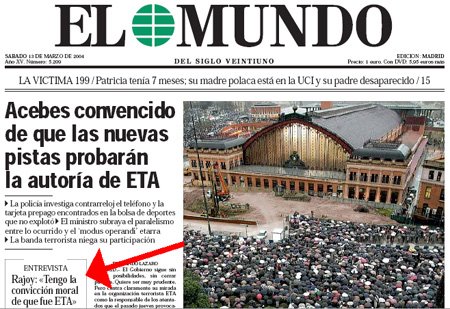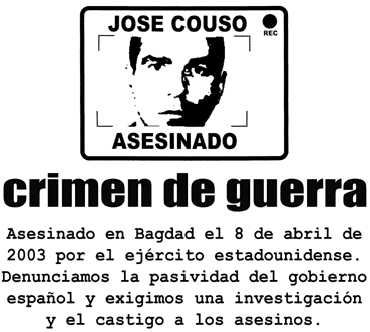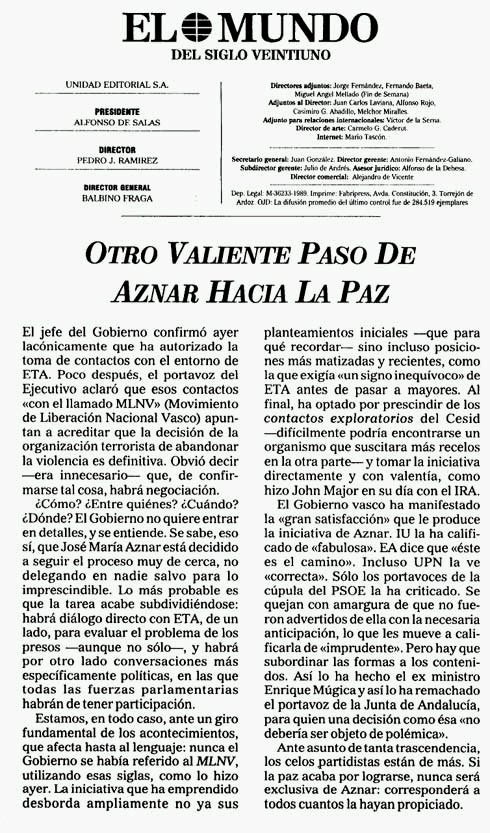
viernes, 30 de marzo de 2012
donde dije digo digo lo contrario
http://www.elplural.com/2012/03/30/viernes-de-dolores-para-rajoy-cospedal-saenz-de-santamaria-y-montoro/
El engaño como forma de hacer política
El el siguiente video se recoge lo que Mariano Rajoy decia en el 2010 sobre la misma.
"Esperemos que la amnistia fiscal sel la última ocurrencia del gobierno"
De nuevo el engaño como forma de hacer politica como ya ha sucedido con la subida de impuestos, la reforma laboral..etc
¿Hasta cuando tenemos que aguantar a un gobierno que engaña constantemente a los ciudadanos?
sábado, 3 de marzo de 2012
A vueltas con el déficit
 Sin ser un experto en economía, la obsesión de este gobierno por la reducción del déficit, cueste lo que cueste, puede ser loable pero no va a conseguir en ningún caso la mejora de la situación económica.
Sin ser un experto en economía, la obsesión de este gobierno por la reducción del déficit, cueste lo que cueste, puede ser loable pero no va a conseguir en ningún caso la mejora de la situación económica.Un analista económico decía el otro día en la radio: “El déficit es como el colesterol: Lo hay bueno y malo”. Personalmente, estoy completamente de acuerdo. El déficit bueno es aquel que se dedica a políticas públicas que ayuden al crecimiento, a políticas de empleo, de competitividad, de apoyo a las PYMES, a la educación, la sanidad…etc. Sin embargo, lo que hay que eliminar es el déficit malo que lleva por ejemplo a construir aeropuertos sin aviones como el de Castellón o a financiar circos mediáticos como el de la formula I en Valencia.
Por ello, si el objetivo del gobierno es reducir el déficit a toda costa para alcanzar los niveles exigidos por Europa, nos vamos de cabeza al hoyo. Para alcanzar dichos niveles el gobiernos tendrá que recortar miles y miles de millones de euros que como siempre saldrán del bolsillo del sufrido contribuyente como ya ha ocurrido con la subida del IRPF , y que continuará con nuevas medidas entre las que no descarto una nueva subida del IVA y otros impuestos además de más recortes en sanidad , educacion y otros servicios publicos.

Como siempre, este recorte del déficit se va a hacer a costa del empobrecimiento de la clase trabajadora. Lógicamente, este empobrecimiento lleva a una reducción del consumo (cuanto menos se tienen menos se gasta) y por tanto a una mayor contracción económica. Si tenemos en cuenta ademas, la dramática situación del empleo en España, con cerca de cinco millones de parados, el estallido social es cuestion de tiempo.

Sin embargo, con voluntad política, se podían tomar otro tipo de medidas que realmente si que ayudarían a la reducción del déficit sin que como siempre paguemos la crisis los mismos:
- ¿Por qué el gobierno no lucha seriamente contra la evasión fiscal de las empresas cuyo importe anual es incalculable y represente miles de millones de euros?
- ¿Por qué no se suprimen los privilegios fiscales de la Iglesia Católica, exenta de impuestos como el IBI, siendo como es propietaria de un número ingente de propiedades inmobiliarias?
- ¿Por qué no se suprimen la Diputaciones provinciales, organismos obsoletos, cuyas funciones en la mayoría de los casos son ya asumidas por las Comunidades Autónomas.
- ¿ Por qué no se suprime el Senado cuya utilidad es nula?
En fin, lo que está claro, es que es muy distinto estar en el gobierno que en la oposición.
¡Qué tiempos aquellos en los que el PP acusaba a Zapatero de gobernar siguiendo los mandados de Merkel!
______________________________________________
The deficit again!
Without being an economic expert , the obsession of this government to, whatever it takes, reduce deficit, can be laudable but it won´t, under any circumstances, improve the economy situation.
An economic analyst, said on the radio the other day: “Deficit is like Cholesterol. There is a good one and a bad one”. Personally, I agree. The good deficit is the one dedicated to public policies that can help to achieve an economic growth, to create jobs, to enforce competitiveness, to support small and medium companies, to invest in education and public Health…etc. However, what it must be avoided is the bad deficit that, for example, builds airports without planes such us the one in Castellón, or supports, financially, media circuses such as the Formula I championship in Valencia.
This is why, if the main objective of this government is to reduce deficit and meet, at any cost, what it has been required in Europe, we will go straight to hell. To achieve those levels required, the government will have to cut thousand and thousand of millions of Euros and, as always, the effort will be made by the taxpayer, as we have already seen with the tax hike recently approved, and it will continue with new measures, such us, I am sure, new VAT increase, other taxes and more cuts in education, public health and other public services.
In my opinion, this is going to cause a bigger impoverishment of the working class. As it is normal, this impoverishment will cause people spend less money (when people have less, people spend less) and as a result of it, the economic contraction will be greater. If we take into consideration the dramatic unemployment situation, with close to five million people without job, the social mess is just a question of time.
However, with a different political approach, other measures could be taken to really help to reduce deficit, without causing that, as always , the crisis is paid by the same group of people. Among those measures, I would say:
- Why the government does not take measures against tax evasion made by companies? The annual amount evaded is very difficult to calculate but it represents thousand of millions of Euros.
- Why the fiscal privileges of the Spanish Church, are not eliminated and it keeps exempt from paying taxes such as Real State taxes, although it is the owner of a huge number of properties?
- Why can not be eliminated the government of the provinces (Diputaciones)? These institutions, archaic and from other times, have competences that in most of the cases are already covered by the Government of the different Autonomous Regions.
- Why the Senate is not suppressed when everyone knows it does not have any use?
It is clear is that is not the same to be in office that to be the Opposition Party.
What times those in which the Popular Party blamed Zapatero of governing Spain by following Merkel dictates¡
viernes, 2 de marzo de 2012
Aguirre: "¿Nosotros cuándo hemos protestado en la calle?"
 Cada vez estoy más convencido que Esperanza Aguirre tiene claro que muchos de sus votantes son tan simples y manipulables que aún siendo ella consciente que algunas de sus opiniones son flagrantes falsedades, da por hecho que estos las asumirán como verdades absolutas. Si no, no se entiende que pueda decir en relación a las distintas manifestaciones que se están desarrollando estos dias en distintas ciudades españolas, y sin ningún sonrojo, lo siguiente: “¿Nosotros cuando hemos protestado en la calle?”
Cada vez estoy más convencido que Esperanza Aguirre tiene claro que muchos de sus votantes son tan simples y manipulables que aún siendo ella consciente que algunas de sus opiniones son flagrantes falsedades, da por hecho que estos las asumirán como verdades absolutas. Si no, no se entiende que pueda decir en relación a las distintas manifestaciones que se están desarrollando estos dias en distintas ciudades españolas, y sin ningún sonrojo, lo siguiente: “¿Nosotros cuando hemos protestado en la calle?”
No hace falta recordar las numerosas ocasiones en que el PP ha salido a la calle para criticar las diferentes medidas que el ejecutivo de Zapatero fue aprobando, medidas que en muchos de los casos, como por ejemplo la aprobación del matrimonio entre personas del mismo sexo, suponían una ampliación de derechos sin precedentes para colectivos históricamente marginados. ¿No recuerda Aguirre aquellas manifestaciones en las que destacados miembros del PP salieron a protestar junto a los obispos?.

Y qué decir de la utilización que hizo el PP de las víctimas del terrorismo para atacar constantemente la política antiterrorista del gobierno. ¿Ya no se acuerda Aguirre de las numerosas manifestaciones en las que participaron miembros de su partido, incluido ella? En fin, reitero que Esperanza Aguirre, al igual que muchos dirigentes de su partido, son conscientes que digan lo que digan y hagan lo que hagan, su fiel infantería lo asumirá como dogma de fe. Si no, no se entiende que Aguirre no solo intente negar el papel del PP como agitador de las masas en la calle durante el gobierno de Zapatero sino que sigue insistiendo, por ejemplo, y aunque los datos digan lo contrario que en Madrid no se han producido recortes ni en educación ni en sanidad.
En fin, reitero que Esperanza Aguirre, al igual que muchos dirigentes de su partido, son conscientes que digan lo que digan y hagan lo que hagan, su fiel infantería lo asumirá como dogma de fe. Si no, no se entiende que Aguirre no solo intente negar el papel del PP como agitador de las masas en la calle durante el gobierno de Zapatero sino que sigue insistiendo, por ejemplo, y aunque los datos digan lo contrario que en Madrid no se han producido recortes ni en educación ni en sanidad.
Aguirre: “When have we protested in the streets?
I am more convinced than ever, that Esperanza Aguirre believes that most of the people who vote the Popular Party (PP) are so basic and easy to be manipulated, that although she is aware that what she says is not true, her voters will take it as an absolute truth. If not, I do not understand that she can say in relation to the demonstrations that are taking place these days in different Spanish cities, and without being embarrassed , the following: “When have we protested in the streets?”
I do not think I need to remind her all the occasions in which the Popular Party has taken the streets on different Spanish Cities to criticize several bills approved during the government of former President Zapatero, most of which meant, such as the bill legalizing same-sex marriage, the extension of rights to several groups of people that had historically been marginalized. Does not Aguirre remember those demonstrations where featured members of the PP participated along with high representatives of the Church?
And what I can say about how the PP used and abused of the victims of terrorist actions to constantly attack the Governments and its policy against terrorism. Has Aguirre forgotten all the demonstrations in which member of the Popular Party, including her, participated?
Anyway, I would say again that Esperanza Aguirre, along with other member of her party, are aware that no matter what they say or they do, the “faithful infantry” will assume it as dogma of faith. If not, it is difficult to understand that Aguirre not only denies the role of the Popular Party on the demonstrations happened during the government of former President Zapatero but also keeps insisting, for example, that in Madrid no cuts have been made either in Public Education or in the Public Health System. Anyone can simply check the data to see that this is not true.















